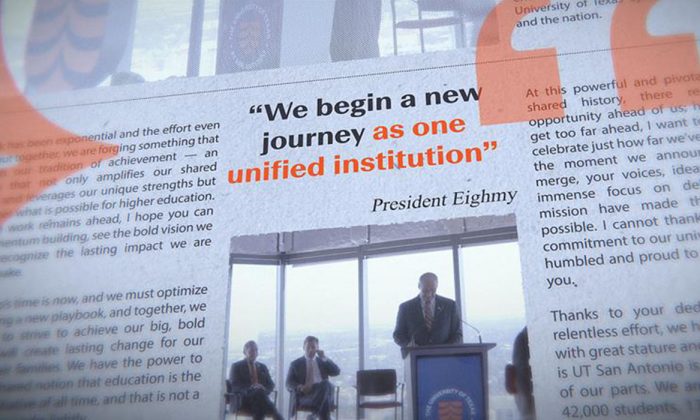The digital divide is not simply computers and connectivity. It’s also about tech literacy, and when it comes to running a small business, knowing your way around digital tools can be critical to success.
A team of UTSA researchers who began looking into the problem several years ago are now developing a literacy training platform using artificial intelligence (AI) that they hope will narrow the divide for small business owners and even the playing field.
The team includes Roger Enriquez, associate professor of criminology and criminal justice; Richard Harris, professor of social work; Christopher Reddick, professor of public administration in the College for Health, Community and Policy, and David Han, Romo Endowed Professor and associate professor in the Carlos Alvarez College of Business at UTSA.
“The ones that didn’t use a lot of digital tools were the ones that continued to struggle, even post-pandemic.” — Roger Enriquez
Together, they published a study, “Digital Divide and Digital Engagement in Small Business Owners: An Examination of Survey Data,” in the journal, Information, Communication & Society, in 2025.
The genesis of their research began during the COVID-19 pandemic when small business owners were turning to support from grants and loans to stay afloat.
“Many of these folks would come in with a shoebox of receipts and the whole application had to be digital,” requiring scanning and uploading documents, Reddick said. “Many of these folks just didn’t have that skillset [despite being] good entrepreneurs and hard working.”
It became clear to Enriquez that the businesses that were bouncing back after the pandemic were those whose owners used the necessary digital tools, he said.
“The ones that didn’t use a lot of digital tools were the ones that continued to struggle, even post-pandemic.”
The multidisciplinary team began looking at the idea of resilience, with digital literacy as a foundation for business survival. They discovered a strong link between digital engagement and expected revenue: Small business owners who used things like websites and e-commerce platforms were more likely to experience revenue growth than those who were 50 years old and older who did not use these tools.
“The digital divide, often perceived as a generation gap, is also a significant sociotechnical and socioeconomic issue,” Han said. “Our studies conducted in San Antonio reveal that factors like age, gender, ethnicity, education and household income profoundly influence digital access and engagement among small business owners.”
As a result of their research, the team determined that tailoring digital literacy training to the needs of underprivileged business owners would be crucial to success.
For a solution, they turned to generative-AI-based chatbots and Agentic AI, technology tools that can provide personalized, on-demand coaching that can help close skill gaps through accessible, step-by-step guidance on using digital tools and understanding how they benefit a business.
The comprehensive and customized digital and AI literacy training platform the professors are developing is a program they hope will help business owners thrive and enhance their operational capacity through practical, scalable support.
“There are always ways to integrate things and streamline, align and amplify,” Harris said. “The beauty of it is that everybody could stand to improve how they do business in a way that makes sense for them.”



